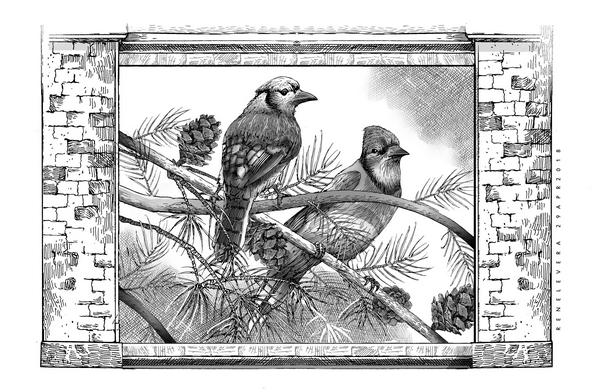
James Wright’s poem, Two Hangovers, has two parts. The second part bears the title, I Try to Waken and Greet the World Once Again, and goes as follows:
In a pine tree,
A few yards away from my window sill,
A brilliant blue jay is springing up and down,
up and down,
On a branch.
I laugh as I see him abandon himself
To entire delight, for he knows as well as I do
That the branch will not break.
Wright uses a phrase from the last line – The Branch Will Not Break – as title for the collection in which the poem appears.
What can we make of this, the second part of the poem?
First, we wee a man suffering from a hangover for having had a drink too many the night before. Despite the headache, he still manages to look out the window and sees a blue jay in a pine tree a few yards away, bouncing on a branch. The sight makes him smile. He knows why the bird repeatedly jumps on the branch – the blue jay is sure that the branch will not break.
We too can attribute the bird’s assurance to the man’s realization that, in the face of the distress that drinking has caused him, morning has come, as it always has, with its gifts of light and lightness.
On a yet higher level, the poem evokes the healing and forgiving power of life, which, despite our bum choices, maintains its goodness and continuity.
So we may read the poem in that manner, pealing the meanings that encrust it in the same way that we strip the layers off an onion – first the actual or physical, then the psychological and then the symbolic.
We have largely taken the point of view of the speaker in the poem, and, indirectly of the blue jay. But sometimes I wonder about the branch, how it happens that, despite the bird’s vigorous jumping, it does not snap.
The bird’s playfulness and the branch’s pliant character betray their youth, their health, the power of that which sustains them. In the case of the branch, the sap that the pine tree nourishes it with.
This brings home to me Jesus’ message in the Gospel of John – “Just as the branch cannot bear fruit by itself, unless it remains in the vine, so neither can you unless you remain in me. I am the vine; you are the branches. The one who remains in me – and I in him – bears much fruit, because apart from me you can accomplish nothing.”
The man with the hangover sees the branch and the vigor that it draws from the tree, which insures it from fractures, and knows deep down that, if stripped from the trunk, the branch will just dry up. He likewise knows that, just as the branch depends on the tree or vine, he owes his life to something or someone outside him, that somehow revives him from his pains and cheers him up to carry on.
A pheasant which a nobleman had given to St. Francis, who was ill, would not leave the side of the latter. The brothers would put the pheasant outside, but it would come back to St. Francis. When given to a visitor who brought it home, the pheasant would not eat. He had to return the bird, and when the pheasant saw St. Francis, it began to eat heartily.
I know why. The pheasant realized that it could stay with St. Francis forever, whose attachment to the vine of Christ made him vibrate and hum with the sap of grace, and a joy to be with – and spring up and down on.
Disclaimer: The comments uploaded on this site do not necessarily represent or reflect the views of management and owner of Cebudailynews. We reserve the right to exclude comments that we deem to be inconsistent with our editorial standards.




